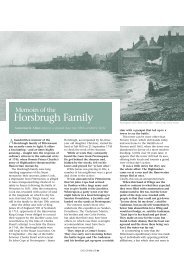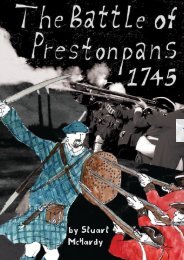Battle of Prestonpans 1745
Battle of Prestonpans 1745
Battle of Prestonpans 1745
You also want an ePaper? Increase the reach of your titles
YUMPU automatically turns print PDFs into web optimized ePapers that Google loves.
VICTORY AT PRESTONPANS<br />
the sense that it imprinted on the Highland Army a potent<br />
sense <strong>of</strong> its tactical superiority.<br />
Something as potent as the spell <strong>of</strong> <strong>Prestonpans</strong> was not to<br />
be banished by a single misfortune or by a device as simple as<br />
new battle tactics. Its destruction was rather the result <strong>of</strong> two<br />
processes which made themselves felt over a period <strong>of</strong> time.<br />
An unmistakeable self-destructiveness became evident<br />
among the Jacobites after their final victory at Falkirk. The<br />
quality <strong>of</strong> decision-making was declining at every level. The<br />
unspectacular but vital support <strong>of</strong>fered by the Jacobite staff<br />
and supply system began to fall away, while at the same time<br />
the strategic focus was lost when the Jacobite forces<br />
abandoned the eastern coastlands and dispersed over the<br />
Highlands. A unified and energetic direction might still have<br />
rallied the Jacobites in a purposeful way before the opening <strong>of</strong><br />
the spring campaign but the high command was faction-ridden<br />
and depleted by ill-health.<br />
The Jacobites, even below their best, might still have had<br />
the measure <strong>of</strong> a Cope or a Hawley. It was a different matter<br />
once the Duke <strong>of</strong> Cumberland took command <strong>of</strong> the<br />
Hanoverian government forces. He grasped that the ‘spell <strong>of</strong><br />
<strong>Prestonpans</strong>’ had to be broken at both the physical and moral<br />
level. He laid solid foundations <strong>of</strong> staff work and logistics,<br />
which not only met the demands <strong>of</strong> campaigning in the<br />
Highlands but reinforced his efforts to persuade his troops<br />
that he was concerned for their welfare. In the same way he<br />
understood that bayonets, unlike broadswords, were effective<br />
only when employed by troops working in total concert and<br />
so his celebrated new bayonet drill was designed above all to<br />
enhance the solidarity <strong>of</strong> his men.<br />
When Cumberland advanced it was only when he was<br />
satisfied that his army was ready in every respect, and just<br />
when the final Jacobite options were closing down. He<br />
reached his enemies at Culloden on 16 April 1746 and beat<br />
them in one <strong>of</strong> the enduringly decisive battles <strong>of</strong> British<br />
history.<br />
References<br />
1. ‘The defeat they gave the King’s troops’: National Archives<br />
<strong>of</strong> Scotland, MS 17501, Saltoun Papers, An Essay, 1747,<br />
on the Scottish Highlands<br />
2. ‘Afterwards Lord Drummore tried to claim that Cope had<br />
17










